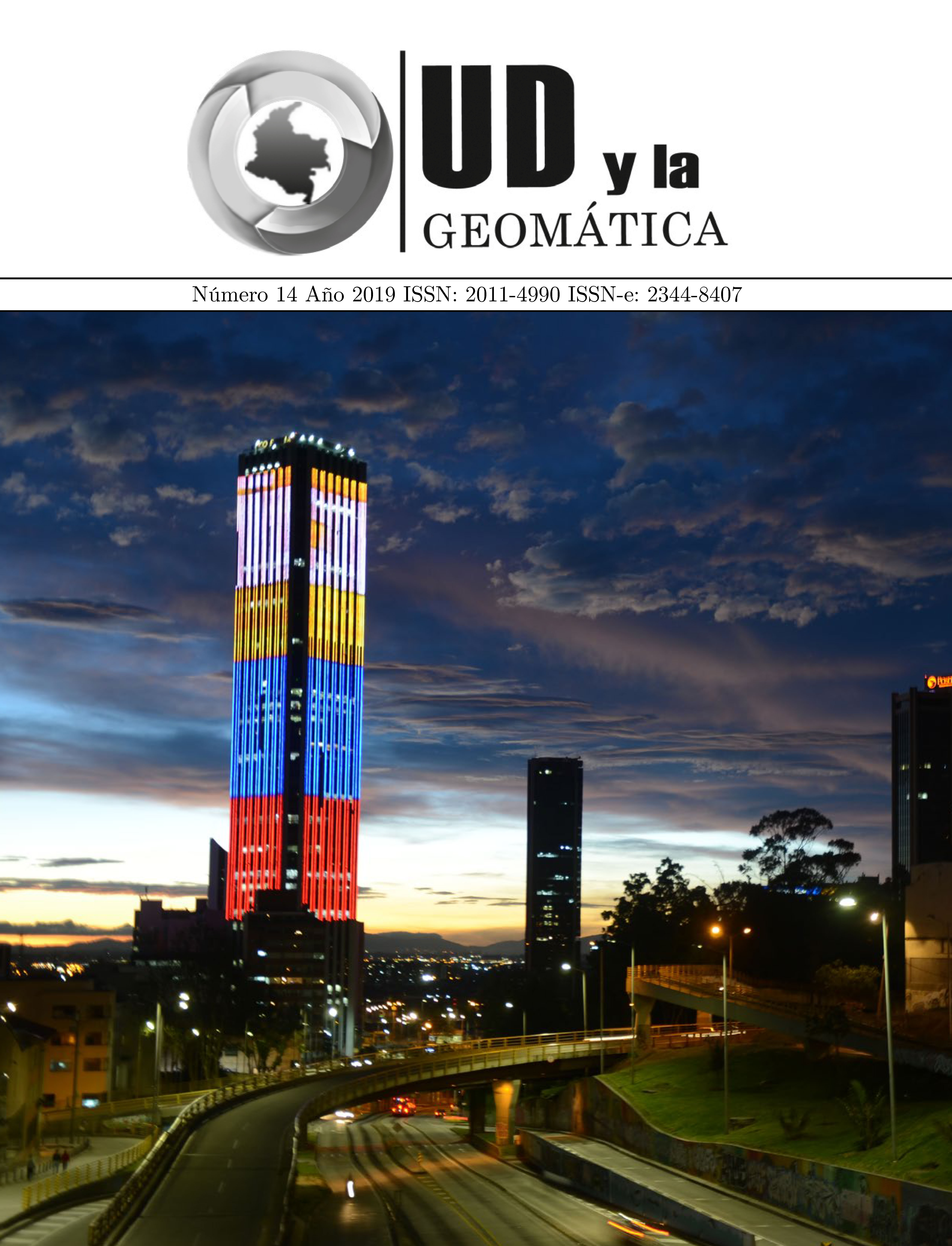DOI:
https://doi.org/10.14483/23448407.15660Publicado:
2019-12-05Edição:
n. 14 (2019)Seção:
Artículo de investigación científica y tecnológicaAnálisis histórico del retroceso glaciar en el nevado del Ruiz considerando el fenómeno de El Niño-Oscilación del Sur
Historical analysis of glacier retreat in the Nevado del Ruiz considering El Niño-Southern Oscillation
Palavras-chave:
Glacier retreat, remote sensing, ENSO, time series, Nevado del Ruíz (en).Palavras-chave:
retroceso glaciar, teledetección, ENSO, serie de tiempo, nevado del Ruiz (es).Downloads
Resumo (es)
En este estudio se analiza el retroceso glaciar del nevado del Ruiz con 27 imágenes del satélite Landsat con un periodo de monitoreo que inicia en el año 1976 y va hasta 2018. Las imágenes fueron procesadas para lograr discriminar el área glaciar usando el índice espectral NDSI (normalized difference snow index). El área glaciar fue extraída mediante una clasificación no supervisada por el clasificador K-Means. Al área glaciar obtenida de cada imagen se le asoció el valor de oceanic Niño index (ONI) correspondiente a la fecha de cada imagen, analizando la influencia de los ciclos cálidos y fríos de El Niño-Oscilación del Sur (ENSO, por su sigla en inglés) en la variación de área glaciar. Para validar esta relación se ajustó una función descrita por una serie de Fourier con un de 0,76, la función permitió asociar la variación de área glaciar con las oscilaciones ENSO. Una función de suma de senos relacionando el área glaciar y tiempo también fue ajustada, sin embargo, esta función no fue suficiente para predecir una fecha de descongelamiento del glaciar. El análisis de los resultados obtenidos de la serie de tiempo muestra que el glaciar es afectado en periodos ENSO de altas temperaturas (El Niño), perdiendo gran parte de su área glaciar y recuperándola en periodos ENSO más fríos (La Niña), contradiciendo los estudios que definen la pérdida de área glaciar con una función lineal negativa.
Resumo (en)
This study analyzes the glacier retreat of Nevado del Ruíz with 27 images from the Landsat satellite with a monitoring period that begins in 1976 and goes until 2018. The images were processed to discriminate the glacier area using the spectral index NDSI (Normalized Difference Snow Index). The glacier area was extracted using the unsupervised classification by the K-Means classifier. The glacier area obtained from each image was associated with the Oceanic Niño Index (ONI) value corresponding to the date of each image, analyzing the influence of the warm and cold cycles of the ENSO (El Niño - Southern Oscillation) in the glacier area variation. To validate this relationship, a function described by a Fourier series with an R2 of 0.76 was adjusted, the function allowed associating the glacial area variation with the ENSO oscillations. A summation function of Breasts relating the glacier area and time was also adjusted, however, this function was not sufficient to predict a date of thawing of the glacier. The analysis of the results obtained from the time series shows that the glacier is affected in ENSO periods of high temperatures (El Niño), losing a good part of its glacier area and recovering it in colder ENSO periods (La Niña), contradicting the studies define the loss of glacial area with a negative linear function.
Referências
Butcher, G., Barnes, C. y Owen, L. (2019). Landsat: The cornerstone of global land imaging. GIM International, pp.31-35.
Ceballos, J.L., Euscátegui, C., Ramírez, J., Cañón, M., Huggel, C., Haeberli, W. y Machguth, H. (2006). Fast shrinkage of tropical glaciers in Colombia. Annals of Glaciology, 43, 194-201.
Chapra, S.C. y Canale, R.P. (2010). Numerical methods for engineers. Boston: McGraw-Hill Higher Education.Chávez, P.S. (1996). Image-based atmospheric correc-tions-revisited and improved. Photogrammetric Engi-neering and Remote Sensing, 62(9), 1025-1035.
Chuvieco, E. (1990). Fundamentos de teledetección espa-cial. Madrid: Ediciones Rialp.
Chuvieco, E. (2016). Fundamentals of satellite remote sen-sing: An environmental approach. Reino Unido: CRC Press.
Dahlman, L. (2009). Climate Variability: Oceanic Niño In-dex. NOAA Climate.gov. Recuperado de https://www.climate.gov/news-features/understanding-climate/climate-variability-oceanic-ni%C3%B1o-indexFood and Agriculture Organization of the United Nations (FAO) (2016). 2015–2016 El Niño Early action and response for agriculture, food security and nutrition.
Recuperado de http://www.fao.org/3/a-i6049e.pdfHuggel, C., Ceballos, J.L., Pulgarĺn, B., Ramírez, J. y Thouret, J.C. (2007). Review and reassessment of ha-zards owing to volcano–glacier interactions in Colom-bia. Annals of Glaciology, 45, 128-136.
Instituto de Hidrología, Meteorología y Estudios Ambien-tales (Ideam) (2012). Glaciares de Colombia: más que montaña con hielo. Bogotá.
Instituto de Hidrología, Meteorología y Estudios Ambien-tales (Ideam) (2018). Glaciares en Colombia. Recupe-rado de http://www.ideam.gov.co/web/ecosistemas/glaciares-colombia.
Kaser, G. (1999). A review of the modern fluctuations of tropical glaciers. Global and Planetary Change, 22(1-4), 93-103.
Knight, P.G. (1999). Glaciers. Reino Unido: Stanley Thornes Ltd. Introducción.
Kovats, R.S. (2000). El Niño and human health. Bulletin of the World Health Organization, 78(9), 1127–1135.
MacQueen, J.B. (1967). Some Methods for classification and Analysis of Multivariate Observations. En Proce-edings of 5th Berkeley Symposium on Mathematical Statistics and Probability 1 (pp. 281–297). EE. UU.: University of California Press.
Pandey, A., Sarkar, M.S., Kumar, M., Singh, G., Lingwal, S. y Rawat, J.S. (2018). Retreat of Pindari glacier and detection of snout position using remote sensing technology. Remote Sensing Applications: Society and Environment, 11, 64-69.
Pérez, C.S. y Gómez, K.D.D. (2018). Análisis del retroceso glaciar del volcán nevado del Ruiz, mediante un estudio multitemporal de imágenes satelitales del periodo 1999-2016. Revista de Topografía Azimut, 1(9), 9-16.
Puertas Orozco, O. y Carvajal Escobar, Y. (2008), Inciden-cia de El Niño-Oscilación del Sur en la precipitación y la temperatura del aire en Colombia, utilizando el Climate Explorer. Revista Científica Ingeniería y Desarrollo, 23, 104-118.
Rabatel, A., Francou, B., Soruco, A., Gómez, J., Cáceres, B., Ceballos, J.L. y Scheel, M. (2012). Current state of glaciers in the tropical Andes: a multi-century per-spective on glacier evolution and climate change. The Cryosphere, 7(1), 81-102.
Salamanca, G.H. y Ruiz, J. (2008). Retroceso glaciar en la Sierra Nevada del Cocuy, Boyacá-Colombia, 1986-2007. Perspectiva Geográfica: Revista del Programa de Estudios de Posgrado en Geografía, 13, 27-36.
Sohn, Y. y Rebello, S. (2002). Supervised and unsupervised spectral angle classifiers. PE&RS, 68(12), 1271-1280.Thompson, L.G., Mosley-Thompson, E., Davis, M.E. y Brecher, H.H. (2011). Tropical glaciers, recorders and indicators of climate change, are disappearing globally. Annals of Glaciology, 52(59), 23-34.
Vélez, E.F.Á., Díaz, H.C., Rodríguez, J.O.G. y Morales, J.A.O. (2018). Cuantificación del retroceso glaciar del nevado del Tolima, aplicando técnicas de teledetección. Revista de Topografía AZIMUT, 9(1), 37-45.
Yue, L., Shen, H., Yu, W. y Zhang, L. (2018). Monitoring of historical glacier recession in yulong mountain by the integration of multisource remote sensing data. IEEE Journal of Selected Topics in Applied Earth Observa-tions and Remote Sensing, 11(2), 388-400.
Como Citar
APA
ACM
ACS
ABNT
Chicago
Harvard
IEEE
MLA
Turabian
Vancouver
Baixar Citação
Licença
La revista UD y la Geomática se encuentra bajo una licencia Creative Commons - 2.5 Colombia License.
Atribución - No Comercial - Sin Derivadas





